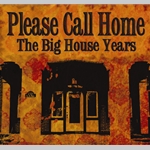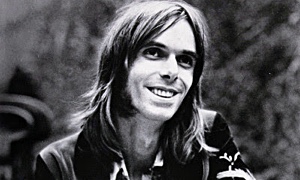Home » Jazz Articles » Film Review » Please Call Home: The Big House Years
Please Call Home: The Big House Years
 The Allman Brothers Band
The Allman Brothers Band Please Call Home: The Big House Years
Bright Blue Sky Productions
2009
The DVD Please Call Home: The Big House Years tells the romanticized story of an early phase in the career of Allman Brothers Band. Group archivist Kirk West makes no attempt to present an objective picture of this period in the group's evolution, but instead chooses to emphasize the factors that nurtured the bonding of the original lineup, their families and friends. As such it provides insight, albeit from a limited perspective, into the unity at the heart of the ABB's music.
As is the case with many musical movements, the so-called "Dixie Rock" the Allman Brothers spawned quickly became reduced to caricature. It remains so in 2009 as the group celebrates its 40th anniversary. Fortunately Please Call Home doesn't trade heavily on that. The history of the band contains more than its share of the archetypal stories of drug abuse and interpersonal struggle, in addition to the sad reality of tragedy in the form of the deaths of founding members Duane Allman and Berry Oakley in eerily similar motorcycle accidents. Presented in a treatise for a Hollywood movie, The Allmans storyline might well be termed contrived.
The archival and contemporary footage of interviews with bandmembers regularly refers to the music that was evolving from their fraternity. Thankfully, this thread of conversation proceeds more often in direct relation to their own relationships, despite some slightly awkward efforts to place the band and their community within the cultural upheaval of the times. The racial theme, for instance, receives the emphasis it warrants but it's a thread of realism not quite given the significance it deserves within the Allman Brothers' fusion of art and life. Accordingly, Please Call Home represents a means of ratifying The Brothers' rightful place in history, free of the often gory and tawdry hearsay that has seeped into the mainstream over the years.
Perhaps equally importantly, West, who never appears on camera, also strives to legitimize ABB and the community that arose around them as a corollary to the West Coast mindset of the late 1960s. Had the director proffered further references to San Francisco impresario Bill Graham's support of the group, through repeated bookings at his East and West coast Fillmore venues (notably including the closing of his New York site) he would haveve posited that idea more authoritatively.
Because Duane Allman's death in October 1971 ended the evolutionary process of the original lineup,there's the inescapable sensation of unfulfilled promise. Still, there remains the creative process Gregg Allman describes continuing as the group's visibility rose in the wake of his sibling's deat. It's a decidely mystical view of the flowering of the household that continued through West's residence and eventually took the form of his ambition to turn the Big House into a bonafide national landmark, The Allman Brothers Band Museum. The business corollary as represented by Phil Walden and Capricorn Records isn't given short shrift in The Big House Years but remains limited, most likely due to the death of Walden (who gained his first cache as manager of Otis Redding, Al Green and Percy Sledge, among others).
The elevation of Oakley's role in the group's development thus becomes a dominant strain in here. ABB drummer Butch Trucks alludes to the bassist's influential contributions, within the household and the band, as secondary only to Duane Allman's (at which point the messianic concept of the late guitarist's life appears most prominently). Oakley's integral role in the Allman legacy finds a natural focal point in this documentary often lost in the general history of the group, thus making this DVD more important than it otherwise might be .
Trucks is candid to a fault in a short excerpt where he refers to now estranged founding member Dickey Betts in less than laudable terms. But that lapse of taste is more than offset by the expression of generosity toward Mama Louise Hudson, the Macon, Georgia restauranteur frequently and effusively lauded in the body of the film and to which an extra feature is devoted. The inclusion of a similar epilogue seems redundant as it's also appended to the main body of video content.
The intermittent but regular insertion of performance footage of The Allman Brothers as well as other Dixie rockers like The Marshall Tucker Band, begs the question of exactly how much such material exists and might eventually be released. Within the specific frame of reference that is Please Call Home, the relative paucity of such content becomes an arbitrarily imposed limitation of a package that would become absolutely essential with the inclusion of some complete performances, either as bonuses on the DVD, as a separate disc in a set, or as web downloads. The packaging that unfolds from a CD digi-pak into a replica of The Big House is clever but no substitute for such substance.
As a result, the appeal of Please Call Home might even be limited to devotees, as it is not sufficiently comprehensive or detailed in its chronology to satisfy the uninitiated or those merely curious about the history of The Allman Brothers Band. Unless, of course, this release ultimately turns into just the first of a multi-chaptered series, in which case, the various threads of the story introduced here might receive the attention they warrant.
That said, this film does derive a palpable drama, when, upon the deaths of Duane Allman, then Berry Oakley, the tranquil source of solidarity becomes a scene of group healing; wisely, West devotes little time to recounting the gradual dispersal of the extended family. Keyboardist Chuck Leavell, hoever, introduces yet another theme worth exploring in the future: the work of the ABB as a quintet and the eventual recruitment of Leavell himself. As conceived and executed, Please Call Home: The Big House Years represents a vivid tribute to The Allman Brothers Band, but it's a work that lacks the decisive, resounding authority of the group's best musicianship.
Tags
About Allman Brothers Band
Instrument: Band / ensemble / orchestra
PREVIOUS / NEXT
Support All About Jazz
 All About Jazz has been a pillar of jazz since 1995, championing it as an art form and, more importantly, supporting the musicians who make it. Our enduring commitment has made "AAJ" one of the most culturally important websites of its kind, read by hundreds of thousands of fans, musicians and industry figures every month.
All About Jazz has been a pillar of jazz since 1995, championing it as an art form and, more importantly, supporting the musicians who make it. Our enduring commitment has made "AAJ" one of the most culturally important websites of its kind, read by hundreds of thousands of fans, musicians and industry figures every month.


























